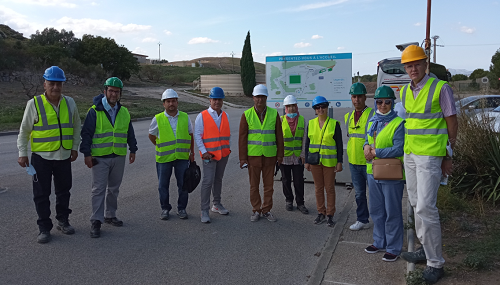
In September 2023, a visit to Tunisia's first sorting and recycling plant for construction and public works materials was organised in the presence of the Ministers for the Environment and Equipment and Housing, which will supply materials for the construction of an innovative road based on recycled materials.
The issue of the availability of materials, particularly aggregates which, after water, are the second most consumed resource in the world, is a pressing one in many countries today, including Tunisia and Lebanon. The challenges of ecological transition and reducing greenhouse gas emissions must also be taken into account: recycling and reusing construction materials is now a priority.
Against this backdrop, the RE-MED partnership project aims to initiate the construction waste market in Mediterranean countries, and to set up a sector for recycled aggregates in road construction. These materials are perfectly capable of partially replacing raw materials, as their characteristics are comparable.
Reciprocal transfer of knowledge

Launched in September 2020, RE-MED is an ambitious programme that enables all partners to benefit from each other's experience and knowledge. Led by Cerema, it is financed as part of the "ENI CBC Mediterranean Sea Basin" cross-border cooperation programme co-financed by the European Union under the European Neighbourhood Instrument.
It brings together eight partners with complementary skills, and involves a wide range of players:
- Academic players for knowledge transfer
- Road construction companies that reuse recycled aggregates,
- The various stakeholders.
The partners:
- France: Cerema (project leader), Dynedoc
- Italy: University of Palermo
- Tunisia: Centre d'Essais et des Techniques de la Construction, Ministry of the Environment, Afrique Travaux
- Lebanon: Ministry of the Environment, Lebanese Syndicate of Public Works Contractors, American University of Beirut.
Since 2020, the project partners have carried out a state of the art study in each of the four countries to identify the methods and actions for recycling construction materials. This work, which was shared with the partners during exchange seminars, revealed the diversity of contexts and practices, sometimes within the same country. The results have been published in five peer-reviewed scientific journals.
Visits to recycling facilities provided an opportunity to share knowledge and complementary approaches. For example, a visit to an Italian unit showed that aggregates can be reintegrated directly into concrete.
Training courses for partners were organised to present the issues, the levers for action and the experience acquired.
At the end of this work, recommendations were formulated to encourage re-use, in order to provide input for discussions on future regulations.
A digital platform, the "RE-MED Community", provides a multicultural space for sharing documentary resources, training, job and internship offers, "Base Experts" skills offers, invitations to tender and events linked to RE-MED.
Putting in place the conditions for the development of re-use channels

A number of difficulties studied in the RE-MED project need to be resolved if sustainable channels for recycling construction materials are to be developed. Upstream, the waste must be collected for reuse, so illegal dumping must be limited, which raises the question of the economic model for recovering and processing it. The RE-MED project includes a section designed to propose viable economic models to the national authorities.
A participatory smartphone application has also been developed to enable users to photograph illegal dumps and share the geolocated photo with managers via an online RE-MED Community platform.
A regulatory framework must also define the conditions under which aggregates must be recycled and reused: one aspect of the RE-MED project is to propose regulatory texts, for the drafting of public procurement contracts that include recycling objectives, for national regulations (for example, Tunisia is considering imposing a proportion of recycled materials for road construction), or for standardisation in order to regulate the use of these materials.
Work will be carried out to define the environmental acceptability and recycling conditions of the materials used: materials and road design methods differ from one country to another, depending on the materials available. In France, Cerema has worked with the various sectors to design guides on the environmental acceptability of recyclable materials in road engineering, which will be adapted for Tunisia and Lebanon through the RE-MED project.
In order to share knowledge on this subject, workshops were organised for project owners, project managers and contractors.
Invitations to tender were issued in early 2022 to upgrade and build construction waste treatment facilities. A total of three facilities will be built or upgraded: 1 in Lebanon and 2 in Tunisia. One of the Tunisian facilities will supply the recycled aggregates needed to build the experimental road.
Update on work in Tunisia

A major event for the project "Tunisia, on the road to a sustainable circular economy, for an accelerated ecological transition" was organised on 13 and 14 September 2023 in Tunis. The Centre d'Essais et des Techniques de Construction, the Ministry of Public Works and Housing and the Ministry of the Environment, the RE-MED project's Tunisian partners and associates, organised a transfer workshop and a site visit to Tunisia's first sorting and recycling facility for building and public works materials, which benefits from equipment financed by the RE-MED project.
Nearly 120 people, including local authorities, ministries, construction and public works companies and research institutes, attended the two-day event to see Cerema's expertise in action. The event was attended by a number of public figures, including the Minister of Public Works and Housing, Ms Sarra Zaafrani Zenzri, the Minister of the Environment, Ms Leila Chikhaoui Mahdaoui, and the Director of the Ministry of the Economy and Planning, Mr Fethi Ben Mimoun.
The project's experts and partners, under the coordination of Cerema, spoke on 3 main topics:
The project framework
Programme: Cross-border cooperation with Mediterranean countries under the European Neighbourhood Instrument (ENI) ENI CBC MED (ENI CBC "Mediterranean Sea Basin" Programme 2014-2020)
Call for strategic projects
Budget: €3,084,250 (90% funded by the European Union)


